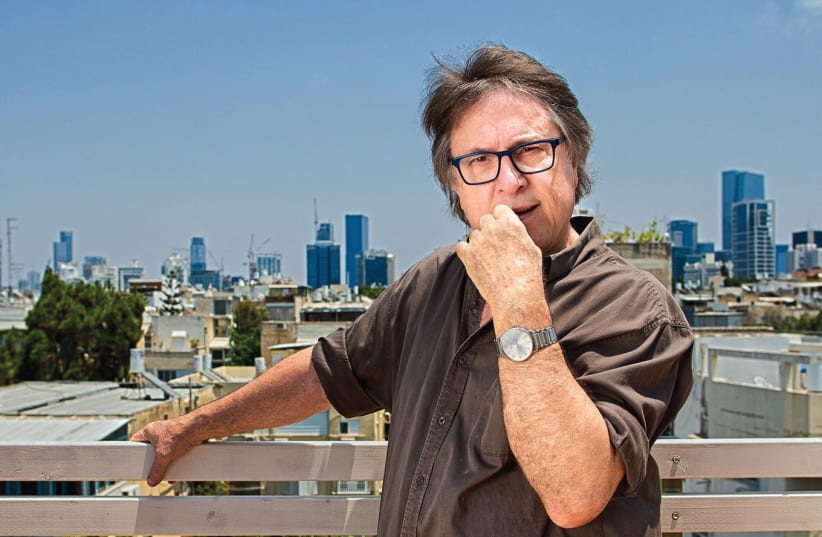So much so, that it was reported that it was those comments that prompted Netanyahu to not attend the EMET Prize ceremony this Sunday, despite the fact that the Prime Minister’s Office has sponsored that award since its inception in 2002.
The EMET prize, which awards excellence to individuals across a spectrum a fields, is usually bereft of controversy. After all, who could begrudge awarding visionaries like renowned chemists Ada Yonath and Dan Shechtman?
However, unlike scientific and mathematical fields, the arts are open to subjectivity, and it is in those fields – music, theater, writing and acting – where opinions are likely to differ.
For EMET laureate actor and director Oded Kotler, this subjectivity is a source of pride. Kotler, who won Best Actor at Cannes for the film Three Days and Child in 1968 and has been a formidable presence on and off the Israeli stage and screen ever since, the notion that art is controversial is something he revels in.
Reflecting two years later on his comments calling people “cud-chewing cattle,” he believes the whole incident is a bit “passe,” but he clarifies that despite the outcry his comments caused, he didn’t mean to offend a particular brand of voters. Rather, he simply wanted to warn against herd mentality and the ever-growing government restrictions on the arts.
“We have to fight for freedom of speech,” he told The Jerusalem Post. “Culture around the world is so clear about this. Art should be able to kick the government in the ass.”
Speaking to the Post, Kotler is charismatic and forceful in his vociferous support of his craft.
“Art is the clown of the town. We all put a sharp pin the balloon,” he said. “In theater, look at all the plays I’ve done – it’s all about that. It all sets up what we’ve been used to doing, what we’re used to thinking, so we can question the normative.”
This is true. Take his most recent play, 'Dear Brother,' which he directed at the Cameri Theatre, which tackles the most sacred of Israeli institutions – the IDF. The play revolves around a wrongful death and cover-up of an Israeli soldier in the Yom Kippur War and attempts to highlight the futility of war. The play asks the audience to question the necessity of armed conflict – even one as crucial to Israel’s survival as the Yom Kippur War.
“With war, there is so much material that asks if it was absolutely necessary,” he said. “Although wars have been there since the beginning of time, we as humans have to fight against having another one.”
So in the aftermath of the recently released film Foxtrot, what does he think of Culture Minister Miri Regev’s threat that the state should not fund such films that could be perceived as anti-Israel?
“Everybody has a right to criticize anything, but [artists] shouldn’t pay for it,” he argued. “We need to be free to talk, save for incitement. I can live here, love the country and say the regime is bad – and they can say I’m bad. It’s okay! At the end of the day, we vote and that makes the final decision.”
The same sentiment applies to Netanyahu’s decision to bow out of Sunday night’s ceremony that will celebrate not only Kotler, but six other accomplished individuals.
“I respect his decision,” Kotler said evenly. “I think it’s an extreme reaction, but it’s a legitimate one. It may be childish; the prime minister shouldn’t deal with such trivial things, but it’s his decision.”
One senses that the political fallout that stemmed from Kotler’s words is just a distraction for the actor, who is much happier focusing on his work and advocating for the advancement of the arts.
“The normal life of artists isn’t very luxurious or comfortable. The money is little. To be an actor in Israel is to understand you are going to work hard and get very little for it,” he lamented. “But we can’t avoid doing it. It’s our profession, source of therapy and hobby all in one.”
To that end, receiving the EMET Prize is doubly gratifying for Kotler because it’s not only public recognition for a lifetime of work, but the $100,000 prize money is a substantive award for an industry where resources are scarce.
As such, despite the millions currently subsidized by the Ministry of Art and Culture, Kotler believes that it is not enough and finds the threat of not subsidizing art the government doesn’t approve as worrisome.
“All art is legitimate,” he declared. “My hope and wish and prayer is that we will have a government that appreciates art and realizes that more funding is needed and won’t dictate what kind of art they will or won’t pay for.”
For now, though, he is thankful to the Prize committee for remaining non-partisan despite the controversy his nomination caused.
“I must compliment the people behind the award. They were aware of my reputation, and stood by my nomination and they didn’t allow any political influence to sway the jury,” he said.
“All I can say is that I humbly accept the award and it encourages my devotion to this wonderful art,” he added.
This article was written in cooperation with The EMET Prize.
